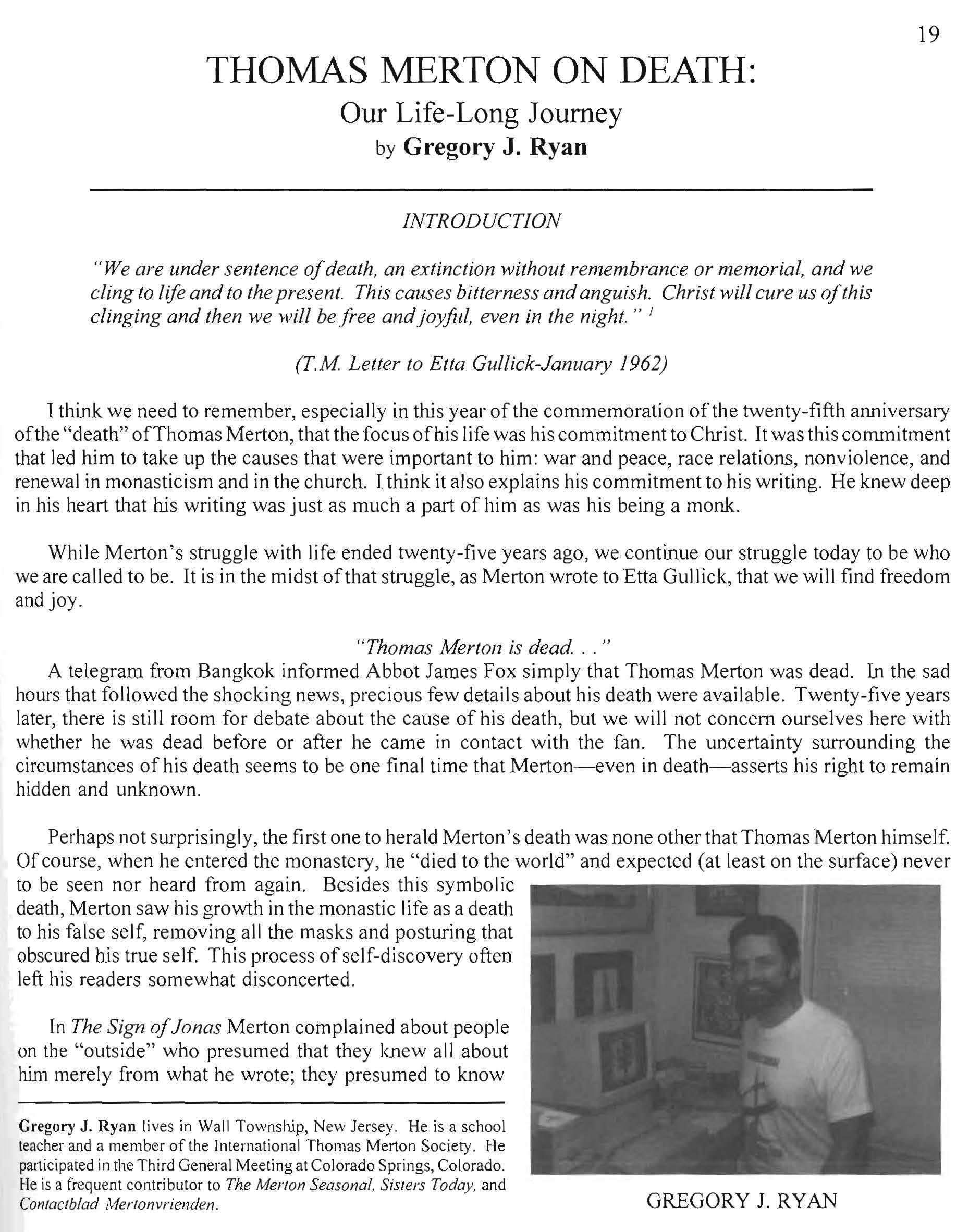

THOMAS MERTON ON DEATH: Our Life-Long Journey
by Gregory J. RyanINTRODUCTION
"We are under sentence ofdeath, an extinction without remembrance or memorial, and we cling to life and to the present This causes bitterness and anguish. Christ will cure us ofthis clinging and th en we will be free and joyfitl, eve n in the night. " 1
(T.M Letter to Etta Gullick-January 1962)I think we need to remember, especially in this year of the commemoration of the twenty-fifth a1U1iversary ofthe "death" ofThomas Merton , that the focus of his life was his commitment to Christ. It was this commitment that led him to take up the causes that were importan t to him: war and peace, race relations, nonviolence, and renewal in mon as tici s m a nd in the church 1think it a lso exp lain s hi s commitment to hi s writing. He knew deep in h is heart that his writing was just as much a part of him as was his being a monk.
While Merton's str ugg le w ith life ended twenty-five yea rs ago, we continue our struggle today to be who we are called to be. It is in th e midst of that struggle, as Merton wrote to Etta Gullick, that we will find freedom and joy.
" Thomas Merton is dead. .
A telegram from Bangkok informed Abbot James Fox s imply that Thomas Merton was dead 1n the sad hours that followed the s hocking new s, p re cious few details about his d ea th were available. Twenty-five years late r, there is still room for debate about the cause of hi s death , but we will not co n cern ourse lv es here with whether he was dead before or afte r he ca m e in contact with the fan . T he uncerta inty surrounding the circumstances of hi s death seems to be one final time that Merton-even in death-asserts his right to remain hidden a nd unknown.
Perhap s not s urprisingly , the first one to herald Merton' s death was none other that T homa s Merton him self. Of course, when h e entered the monastery , he "died to th e world" and expected (at least o n the surface) never to be see n nor heard from aga in Besides this symbo li c death , Merton sa w his growth in the monastic li fe as a death to hi s false se lf, removing all th e mask s and po sturing that obscured hi s true se lf. This proce ss of self-discovery often left hi s readers somewhat disconcerted
In The Sign ofJonas Merton complained about peop le on the "outs ide " who presumed that they knew all about him me r ely from what he wrote ; they presumed to know
Gregory J. Ryan lives in Wall Town s hip, New Jersey. He is a sch oo l teac he r and a member of the Jnternatio na l Thomas Merton Society H e pat1icipated in the Third Ge nera l Mee ting a t Co lora do Spr in gs, C olora do . He is a frequ e nt cont r ibutor to The Me rton Seaso nal, Sis te rs Today. and Contactblad Mertonvri enden.
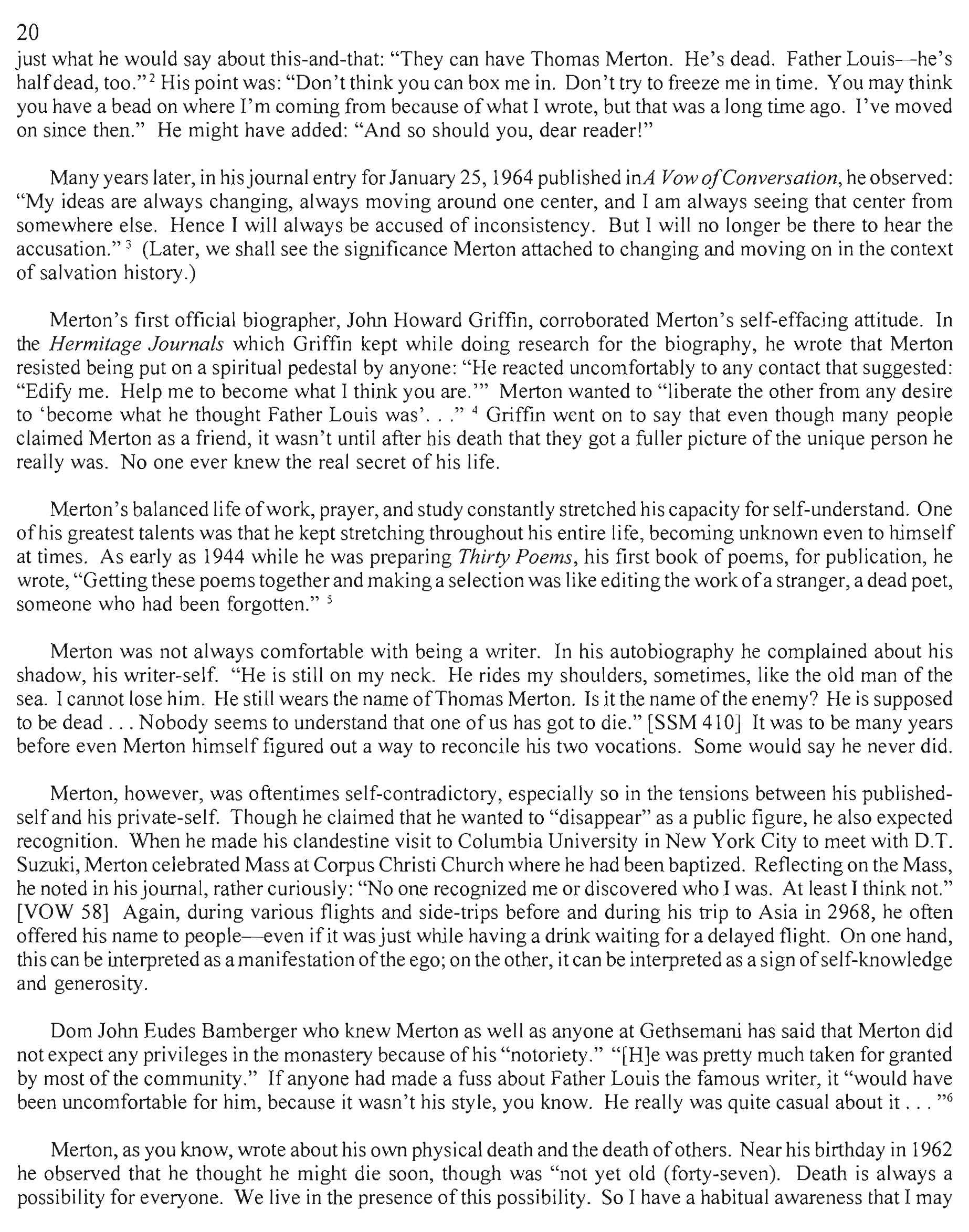
just what he would say about this-and-that: "They can have Thomas Merton He' s dead. Father Louis-he's half dead, too " 2 His point was: "Don't think you can box me in. Don't try to freeze me in time. You may th ink you have a bead on where I'm coming from because of what I wrote, but that was a Jong time ago. I've moved on since then." He might have added: "And so should you, dear reader!"
Many years later, in his journal entry for January 25, 1964 published inA Vow ofConversation, he observed: "My ideas are always changing, always moving around one center, and I am alway s seeing that center from somewhere else . Hence I will always be accused of inconsistency. But I will no longer be there to hear the accusation." 3 (Later, we shall see the significance Merton attached to chang ing and moving on in the context of salvation history.)
Merton's first official biographer, John Howard Griffin, corroborated Merton 's self-effacing attitude. In the Hermitage Journals which Griffin kept while doing research for the biography, he wrote that Merton resisted being put on a spiritual pedestal by anyone: "He reacted uncomfortably to any contact that suggested: " Edify me . Help me to become what I think you are."' Merton wanted to "liberate the other from any de s ire to 'become what he thought Father Louis was '. . ." 4 Griffin went on to say that even though many people claimed Merton as a friend, it wasn't until after his death that they got a fuller picture of the uni q ue person he really was. No one ever knew the real secret of his life.
Merton's balanced life of work, prayer, and study constantly stretched hi s capacity for self-understand. One of his greatest talents was that he kept stretching throughout hi s entire life, becoming unknown even to himself at times. As early as 1944 while he was preparing Thirty Poems, his first book of poems, for publication, he wrote, "Getting these poems together and making a se lection was like editing the work of a stranger, a dead poet, someone who had been forgotten " ;
Merton was not always comfortable with being a writer. In his autobiography he com plained about his shadow, his writer-self. "He is still on my neck. He rides m y shoulders, sometimes, l ike the old man of the sea. I cannot lose him. He still wears the name ofThomas Merton. Is it the name of the enemy? He is supposed to be dead ... Nobody seems to understand that one of us has got to die ." [SSM 410] It was to be many years before even Merton himself figured out a way to reconcile his two vocations. Some would say he never did.
Merton , however, was oftentimes self-contradictory, especially so in the tensions between his publishedself and his private-self. Though he claim e d that he wanted to " disappear" as a public figure, he also expected recognition. When he made his clandestine visit to Columbia University in New York City t o meet with D.T. Suzuki, Merton celebrated Mass at Corpus Christi Church where he had been baptized. Reflecting on the Mass, he noted in his journal , rather curiously: "No one recognized me or discovered who I was. At le ast I think not. " [VOW 58] Again , during various flights and side-trips before and dur ing his trip to Asia in 2968, he often offered his name to people- even ifit was just while having a drink waiting for a delayed flight. On one hand, thi s can be interpreted as a manifestation of the ego; on the other, it can be interpreted as a sign of self-knowledge and generosity.
Dom John Eudes Bamberger who knew Merton as well as anyone at Gethsemani has said that Merton did not expect any privileges in the monastery because of his " notoriety." " [H]e was pretty much taken for granted by most of the community." If anyone had made a fuss about Father Louis the famous writer, it "would have been uncomfortable for him , because it wasn ' t his style, you know . He really was quite casual about it ... " 6
Merton, as you know, wrote about his own physical death and the death of others. Near his birthday in 1962 he observed that he thought he might die soon, though was " not yet old (forty-seven). Death is always a possibility for everyone. We live in the presence of this possibility So I have a habitual awareness that I may
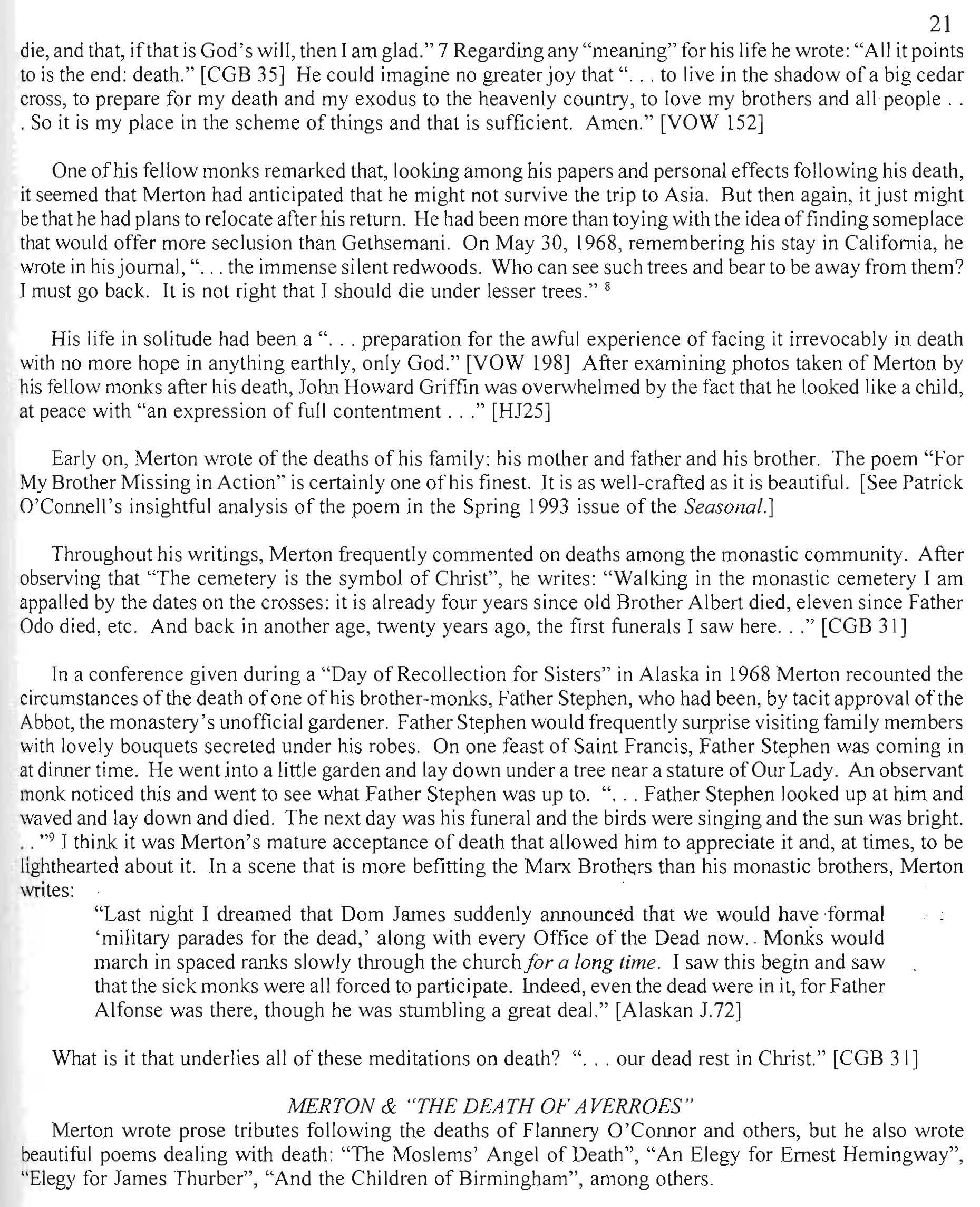
die, and that, ifthat is God's will, then I am glad." 7 Regarding any "meaning" for his life he wrote: "All it points to is the end: death " [CGB 35] He could imagine no greater joy that" to live in the shadow of a big cedar cross, to prepare for my death and my exodus to the heavenly country, to love my brothers and all people .. . So it is my place in the scheme of things and that is sufficient. Amen." [VOW 152]
One of his fellow monks remarked that, looking among bis papers and personal effects following his death, it seemed that Merton had anticipated that he might not survive the trip to Asia. But then again, it just might be that he had plans to relocate after his return. He had been more than toying with the idea of finding someplace that would offer more seclusion than Gethsemani . On May 30, 1968, remembering his stay in California, he wrote in his journal," ... the immense silent redwoods. Who can see such trees and bear to be away from them? I must go back. It is not right that I should die under lesser trees." 8
His life in solitude had been a" ... preparation for the awful experience of facing it irrevocably in death with no more hope in anything earthly, only God." [VOW 198] After examining photos taken of Merton by his fellow monks after his death, John Howard Griffin was overwhelmed by the fact that he looked like a child, at peace with "an expression of full contentment ... " [HJ25]
Early on, Me1ton wrote of the deaths of his family: his mother and father and his brother. The poem "For My Brother Missing in Action" is certainly one of his finest. It is as well-crafted as it is beautiful. [See Patrick O 'Co nnell's insightful analysis of the poem in the Spring l 993 issue of the S easonal .]
Throughout his writings, Merton frequently commented on deaths among the monastic community. After observing that "The cemetery is the symbol of Christ", he writes: "Walking in the monastic cemetery I am appalled by the dates on the crosses: it is already four years since old Brother Albert died , eleven since Father Odo died, etc. And back in another age, twenty years ago, the first funerals I saw here " [CGB 31]
In a conference given during a "Day of Reco l lection for Sisters" in Alaska in 1968 Me1ton recounted the circum s tances of the death ofone of his brother-monks, Father Stephen, who had been, by tacit approval of the Abbot, the monastery's unofficial gardener. Father Stephen would frequently surprise visiting family members with lovely bouquets secreted under his robes. On one feast of Saint Francis, Father Stephen was coming in at dinner time. He went into a little garden and lay down under a tree near a stature of Our Lady. An observant monk noticed this and went to see what Father Stephen was up to. " Father Stephen looked up at him and waved and lay down and died The next day was his funeral and the birds were singing and the sun was bright. • " 9 I think it was Merton's mature acceptance of death that allowed him to appreciate it and, at times, to be lighthearted about it. In a sce ne that is more befitting the Marx Brothers than his monastic brothers, Merton writes:
"Last night I dreamed that Dom James suddenly announced that we would have formal 'military parades for the dead,' along with every Office of the Dead now . . Monk s would march in spaced ranks slowly through the church/or a long time. I saw this begin and saw that the sick monks were all forced to participate. Indeed, even the dead were in it, for Father Alfonse was there, though he was stumbling a great deal." [Alaskan J.72)
What is it that underlies all of these meditations on death? " ... our dead rest in Christ." [CGB 31]
MERTON & "THE DEATH OF AVERROES"
Merton wrote prose tribute s following the deaths of Flannery O'Connor and others, but he also wrote beautiful poems dealing with death: " The Moslems' Angel of Death", "An Elegy for Ernest Hemingway" , "E legy for James Thurber", "And the Children of Birmingham '', among others.
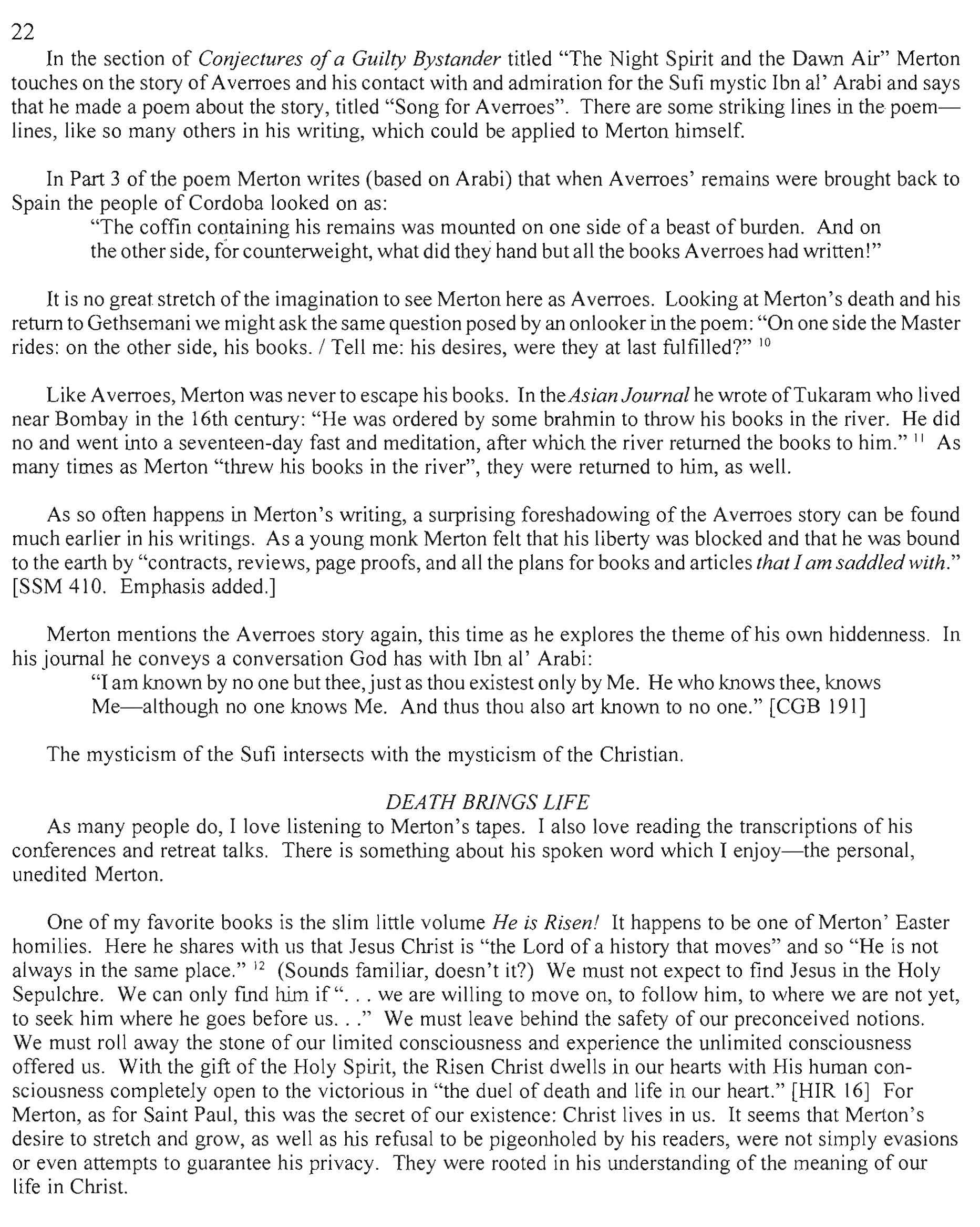
In the section of Conjectures of a Guilty Bystander titled "The Night Spirit and the Dawn Air" Merton touches on the story of Averroes and his contact with and admiration for the Sufi mystic Ibn al' Arabi and says that he made a poem about the story, titled "Song for Averroes" . There are some striking lines in the poemlines, like so many others in his writing, which could be applied to Merton himself.
In Part 3 of the poem Merton writes (based on Arabi) that when Averroes' remains were brought back to Spain the people of Cordoba looked on as:
"The coffin containing his remains was mounted on one side of a beast of burden . And on the other side, for counterweight, what did they hand but all the books Averroes had written!"
It is no great stretch of the imagination to see Merton here as Averroes. Looking at Merton's death and his return to Gethsemani we might ask the same question posed by an onlooker in the poem: "On one side the Master rides: on the other side, his books . I Tell me: his desires, were they at last fulfilled?" 10
Like Averroes, Merton was never to escape his books. In theAsianJournal he wrote ofTukaram who lived near Bombay in the 16th century: "He was ordered by some brahmin to throw his books in the river. He did no and went into a seventeen-day fast and meditation, after which the river returned the books to him. " 11 A s many times as Merton "threw his books in the river'', they were returned to him, as well .
As so often happens in Merton's writing, a surprising foreshadowing of the Averroes story can be found much earlier in his writings. As a young monk Merton felt that his liberty was blocked and that he was bound to the earth by "contracts, reviews, page proofs, and all the plans for books and articles that I am saddled with. " [SSM 4 l 0. Emphasis added.]
Merton mentions the Averroes story again, this time as he explores the theme of his own hiddenness. In his journal he conveys a conversation God has with Ibn al' Arabi:
"I am known by no one but thee,j ust as thou existest only by Me. He who knows thee, knows Me-although no one knows Me . And thus thou also art known to no one ." [CGB l 9 l]
The mysticism of the Sufi intersects with the mysticism of the Christian .
DEATH BRINGS LIFE
As many people do, I love listening to Merton's tapes . I also love reading the transcriptions of his conferences and retreat talks. There is something about his spoken word which I enjo y-the personal, unedited Merton.
One of my favorite books is the slim little v olume He is Risen ! It happens to be one of Me1ton ' Easter homilies. Here he shares with us that Jesus Christ is "the Lord of a history that moves " and so "He is not always in the same place." 12 (Sounds familiar, doesn't it?) We mu s t not expect to find Jesus in the Hol y Sepulchre. We can only fmd him if " . .. we are willing to move on, to follow him , to where we are not yet , to seek him where he goes before us . . ." We must leave behind the safety of our preconceived notions. We must roll away the stone of our limited consciousness and ex p erience the unlimite d consciousness offered us. With the gift of the Holy Spirit , the Risen Christ dwell s in our hea1ts w ith Hi s human consciousness completely open to the victorious in " the duel of death and life in our heart." [HIR 16] For Merton, as for Saint Paul, this was the secret o f our existence: Christ lives in us. It seems that Merton's desire to stretch and grow, as well as his refusa l to be pigeonholed by his readers , were not simply ev as ions or even attempts to guarantee his privacy. They were rooted in his understanding of the m eaning of our life in Christ.
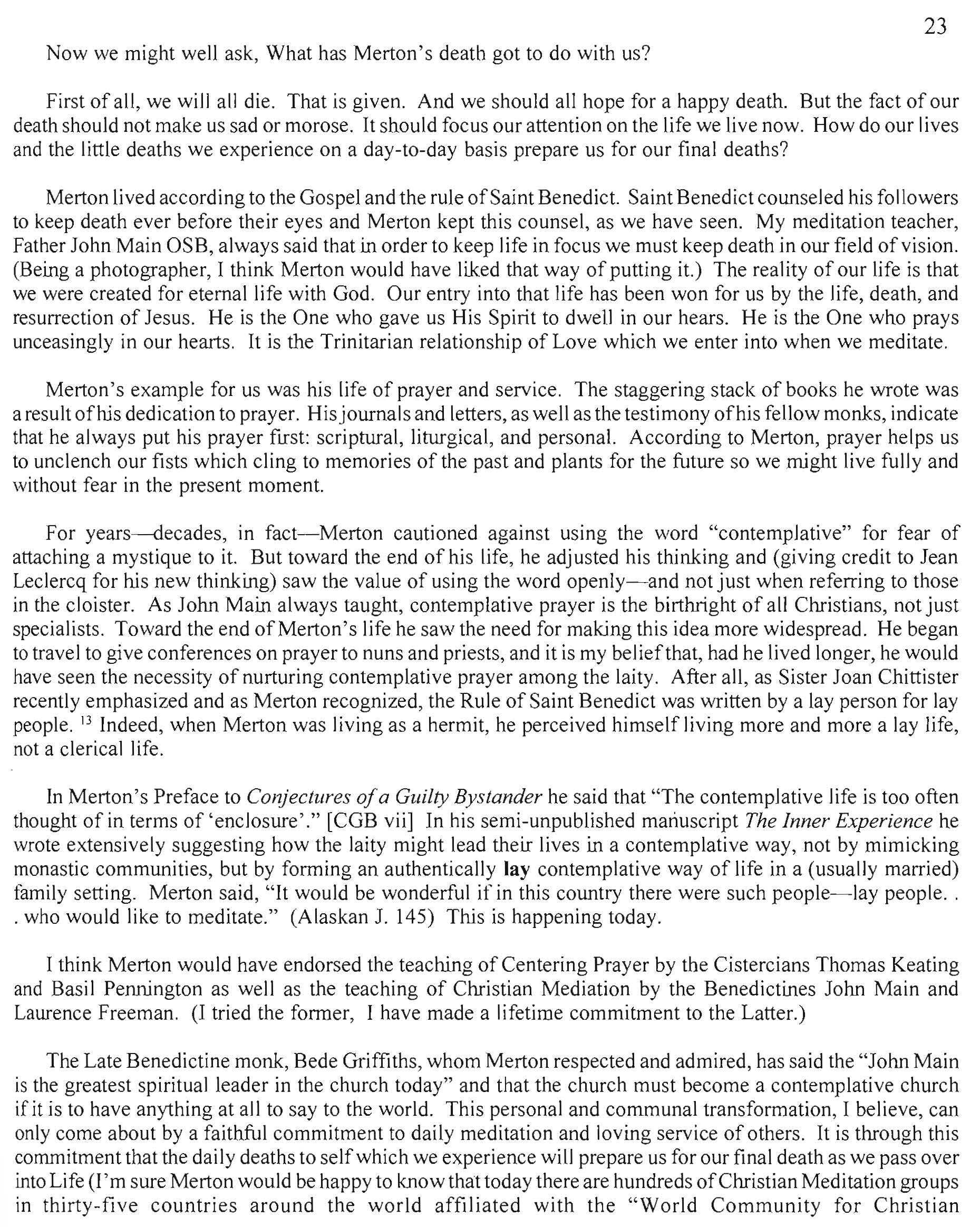
Now we might well ask, What has Merton ' s death got to do with us?
First of all, we will all die. That is given. And we should all hope for a happy death. But the fact of our death should not make us sad or morose . It should focus our attention on the life we live now . How do our lives and the little deaths we experience on a day-to-day basis prepare us for our final deaths?
Merton lived according to the Gospel and the rule of Saint Benedict. Saint Benedict counseled his followers to keep death ever before their eyes and Merton kept this counsel, as we have seen. My meditation teacher, Father John Main OSB , always said that in order to keep life in focus we must keep death in our field of vision. (Being a photographer, I think Merton would have liked that way of putting it.) The reality ofour life is that we were created for eternal life with God. Our entry into that life has been won for us by the life, death, and resurrection of Jesus . He is the One who gave us His Spirit to dwell in our hears. He is the One who prays unceasingly in our hearts. It is the Trinitarian relationship of Love which we enter into when we meditate.
Merton's example for us was his life of prayer and service. The staggering stack of books he wrote was a result of his dedication to prayer His journals and letters, as well as the testimony of his fellow monks, indicate that he always put his prayer first: scriptural, liturgical, and personal. According to Merton, prayer helps us to unclench our fists which cling to memories of the past and plants for the future so we might live fully and without fear in the present moment.
For years--<lecades, in fact-Merton cautioned against using the word "contemplative" for fear of attaching a mystique to it. But toward the end of his life, he adjusted his thinking and (giving credit to Jean Leclercq for his new thinking) saw the value of using the word openly-and not just when referring to those in the cloister. As John Main always taught, contemplative prayer is the birtluight of all Christians, not just specialists. Toward the end of Merton's life he saw the need for making this idea more widespread . He began to travel to give conferences on prayer to nuns and priests, and it is my belief that , had he lived longer, he would have seen the necessity of nurturing contemplative prayer among the laity. After all, as Sister Joan Chittister recently emphasized and as Merton recognized, the Rule of Saint Benedict was written by a lay person for lay people. 13 Indeed , when Merton was I iving as a hermit, he perceived himself living more and more a lay life, not a clerical life.
In Merton's Preface to Conjectures of a Guilty Bystander he said that "The contemplative life is too often thought of in terms of 'enclosure ' ." [CGB vii] In his semi-unpublished manuscript The Inner Experience he wrote extensively suggesting how the laity might lead thei.r lives in a contemplative way, not by mimicking monastic communities , but by forming an authentically lay contemplative way of life in a (usually married) family setting. Merton said, "It would be wonderful if in this country there were such people- lay people . . who would like to meditate." (Alaskan J. 145) This is happening today.
I think Merton would have endorsed the teaching of Centering Prayer by the Cistercians Thomas Keating and Basil Pennington as well as the teaching of Christian Mediation by the Benedictines John Main and Laurence Freeman. (I tried the fonner , I have made a lifetime commitment to the Latter.)
The Late Benedictine monk, Bede Griffiths , whom Merton respected and admired, has said the " John Main is the greatest spiritual leader in the church today" and that the church must become a contemplative church if it is to have anything at all to say to the world. This personal and communal transformation, I believe, can only come about by a faithful commitment to daily meditation and loving service of others . It is through this commitment that the daily deaths to self which we experience will prepare us for our final death as we pass over into Life (I'm sure Merton would be happy to know that today there are hundreds of Christian Meditation groups in thirty-five countries around the world affiliated with the " World Community for Christian
Meditation" based in London under the leadership of Laurence Freeman, following the teaching of John Main. The practice of Centering Prayer with its own "Contemplative Outreach has also become widespread.) livingthrough silence and simplicity of selfless, image-less prayer. We give up our own thoughts, ideas, plan s- no matter how holy and noble they may be, just to BE in God's presence . We open our hearts to Reality, God's life within us. It is in this way that death brings Life. Even now.
HE IS NOT HERE .. .
Following Merton's suggestion, we should not expect to fmd Christ in any " place" any more that we should not expect to find Merton in any ''place". He is not here or there. He is "everywhere"-beyond place, beyond time. He has gone before us, back to the Father.
It is fitting that we close with remembrances by two of Merton's friends. Dom Jean Leclercq OSB spoke of his friend's untimely death this way: "The moment having come, according to his last words, .(Merton] disappeared. But at the same time, and forever , he remains." [Quoted in HJ 4]
Ron Seitz, a fellow poet and disciple recalled a private "novice lecture" given by Merton in which Merton said he'd one day become pure spirit. Listen to the master:
"My legacy-that's what I leave you ... by not leaving you, ever.
"My mark on this world is that there is no mark.
"My contribution to you is my grand refusal to die!
"You've got me on your hands forever . . . on your hands ... in your heart . . . the tip of your tongue ... the words from your mouth . .. the light of your eye .. . the g lint in your think . . . . - Whatever gooses you to life! and kills the dead blahs!
"It is the resurrection of a body who never died.
" Life eternal. Pure spirit." 14
To which we all say : Amen Alleluia!
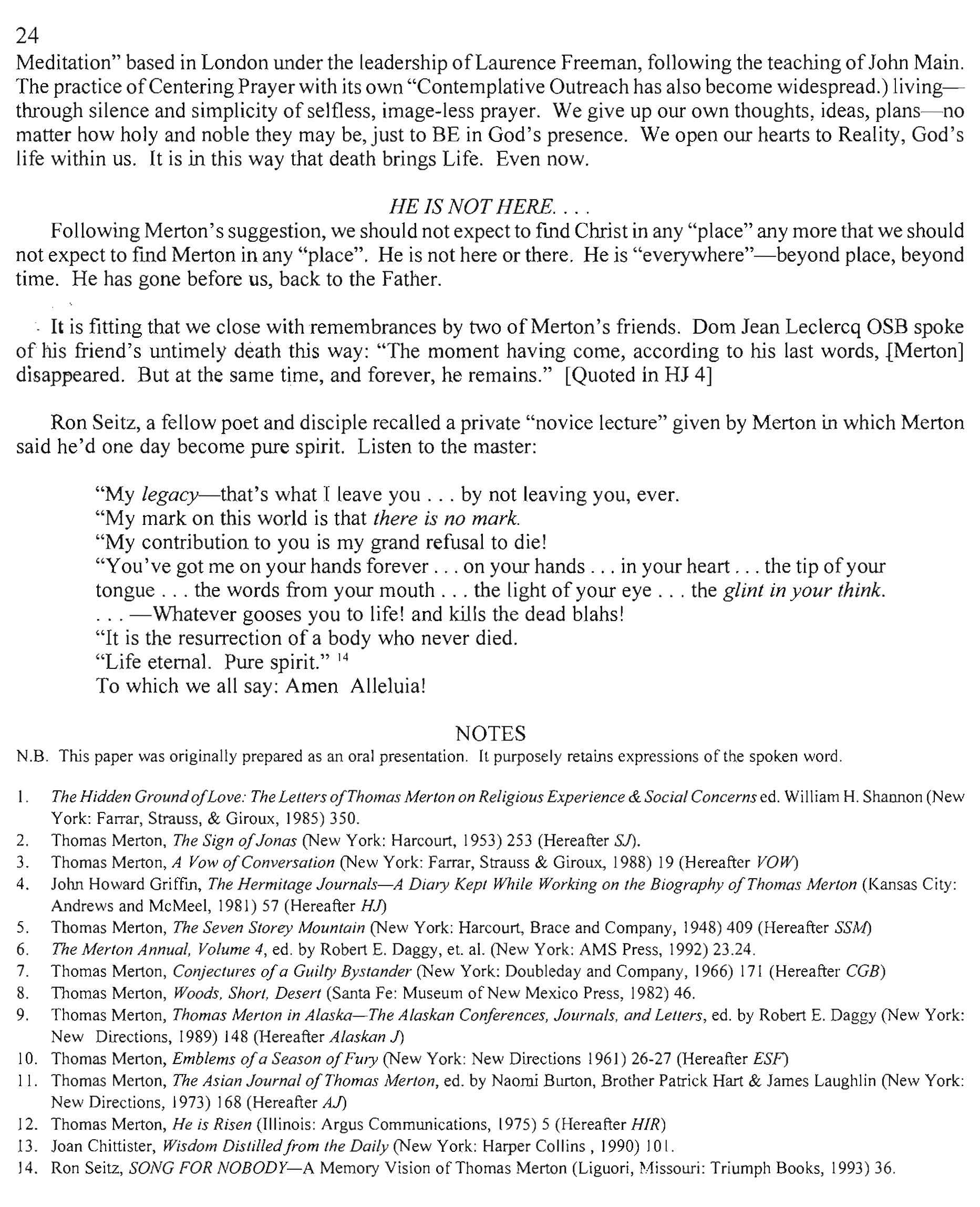
NOTES
N.B. Thi s paper was originally prep ared as an oral presen ta ti on. It purposely retains expre ssio ns ofth.e spoken word
I The Hidden Ground ofLove: The L e n ers a/Thomas M erton on Religious Experience & Social Concerns ed. W illiam H Shannon (New York: Farrar, Strauss, & Giroux, 1985) 350.
2. Thomas Merton, The Sign ofJonas (New York: Harcou rt, 1953) 253 (Hereafter SJ) .
3. Thomas Merton, A Vow of Conversation (New York: Farrar, Strauss & Giroux, 1988) 19 (Hereafter VOW)
4. John Howard Griffin, The Hermitage Journals-A D imy Kept While Working on the Biography of Thomas Merton (Kansas City: Andrew s and Mc Mee I, 1981) 57 (Hereafter HJ)
5. Thom as Merton, The Seven Storey Mountain (New York: Harco urt, Brace a nd Company, 1948) 409 (He reafter SSM)
6. Th e Merton Annual, Volu me 4, ed. by Robert E. Daggy, et. al. (New York: AM S Press, 1992) 23.24
